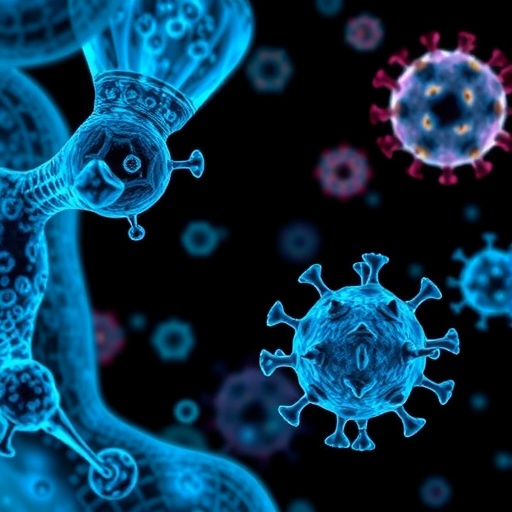In the ongoing battle against the COVID-19 pandemic, researchers are continually exploring new avenues to combat the virus’s harmful effects. Recent studies have identified a compound known as [6]-shogaol, derived from ginger, which exhibits potential therapeutic benefits against SARS-CoV-2, the virus responsible for COVID-19. A research team led by Tanikawa, T., Hayashi, T., and Kiba, Y., recently published their findings in BMC Complementary Medicine and Therapies, highlighting the significant inhibitory effect of this natural compound on the viral protease activity crucial for viral replication.
[6]-shogaol is a phenolic compound known for its bioactive properties, primarily isolated from ginger rhizomes. The compound’s structure allows it to interact with various biological targets, which may be responsible for its anti-inflammatory, antioxidative, and anti-cancer actions. However, its role in viral infection management has garnered attention, particularly concerning SARS-CoV-2, whose rapid transmission and mutation rates have posed continuous challenges for healthcare systems globally.
The researchers employed advanced molecular biology techniques to examine the interaction between [6]-shogaol and the main protease (3CLpro) of SARS-CoV-2. This protease plays a critical role in the viral life cycle, facilitating viral replication and maturation. By inhibiting this enzyme, [6]-shogaol may disrupt the replication chain of the virus, providing a strategic therapeutic approach to deter COVID-19 progression.
In their experiments, the team demonstrated that [6]-shogaol reduces the catalytic activity of 3CLpro significantly. Through detailed kinetic analysis, the researchers elucidated how the compound binds to the active site of the protease, thereby inhibiting its ability to process viral polyproteins. This represents a crucial finding, as the main protease is considered a prime target for antiviral drug development, and [6]-shogaol’s efficacy in this regard positions it as a candidate worthy of further exploration.
The study meticulously outlined the methodology, utilizing both in vitro assays and computational simulations to assess the interaction dynamics between [6]-shogaol and the viral protease. These methods added a robust layer of validity to their findings, ensuring that the observed effects were not merely coincidental. The computational modeling provided insight into the binding interactions at a molecular level, supporting the hypothesis that [6]-shogaol can effectively inhibit the activity of 3CLpro.
Moreover, the implications of this research extend beyond just the compound itself; they highlight the potential of using plant-derived phytochemicals in developing new antiviral treatments. This angle is particularly compelling in light of the growing interest in natural products for drug discovery, especially as many synthetic drugs have encountered limitations due to resistance, side effects, or inadequate efficacy.
Beyond its laboratory achievements, the research emphasizes the importance of dietary considerations in supporting immune health during viral outbreaks. Ginger, containing [6]-shogaol, has been a staple in traditional medicine for centuries, known for its various health benefits. By integrating such natural compounds into therapeutic protocols, there exists a dual advantage: promoting overall health and providing targeted antiviral effects.
As global health authorities continue to navigate the challenges posed by COVID-19 variants, the findings bring hope to the potential for alternative treatments. Utilizing compounds like [6]-shogaol may help mitigate the dire consequences of infections, particularly in populations where vaccination rates are below target levels or in those who are unable to receive vaccines due to health conditions.
However, while the initial results are promising, the researchers stress the need for further investigations. Future studies must encompass in vivo models to determine the overall efficacy and safety profile of [6]-shogaol. Additionally, the exploration of combination therapies involving this compound with existing antiviral agents could unlock even greater therapeutic avenues in combating SARS-CoV-2.
As the search for innovative treatments continues, the work of Tanikawa and his colleagues stands out, emphasizing the timeless adage that nature often holds the key to our most pressing medical challenges. The integration of traditional knowledge with modern scientific methods could pave the way for breakthroughs that may ultimately enhance our arsenal against COVID-19 and other viral pathogens.
The research also poses a critical call to action for the scientific community: to prioritize research into the properties of natural compounds and engage in collaborative efforts that could expedite the discovery of effective antiviral agents. By tapping into the vast biodiversity of phytochemicals available, researchers can help to fortify public health responses.
In conclusion, the team’s findings regarding [6]-shogaol’s inhibitory effect on SARS-CoV-2’s main protease not only contribute to our understanding of potential therapeutic options but also open a dialogue about integrating natural remedies into modern medicine. As the landscape of infectious diseases continues to evolve, exploring the synergies between traditional and contemporary therapeutic strategies looks increasingly vital.
This study sheds light on an innovative pathway within the complex field of virology and pharmacology, underscoring the latent potential for nature-derived substances in addressing global health crises. Only time will tell how these discoveries can translate into robust treatment options, but the journey towards finding an effective solution against COVID-19 is undeniably enriched by such research.
Subject of Research: Inhibitory effect of [6]-shogaol against 3CLpro activity and SARS-CoV-2 infection.
Article Title: Correction: Inhibitory effect of [6]-shogaol against 3CLpro activity and SARS-CoV-2 infection.
Article References:
Tanikawa, T., Hayashi, T., Kiba, Y. et al. Correction: Inhibitory effect of [6]-shogaol against 3CLpro activity and SARS-CoV-2 infection.
BMC Complement Med Ther 25, 415 (2025). https://doi.org/10.1186/s12906-025-05164-7
Image Credits: AI Generated
DOI:
Keywords: COVID-19, SARS-CoV-2, [6]-shogaol, 3CLpro, antiviral research, natural compounds, ginger, protease inhibition, phytochemicals, virology.




